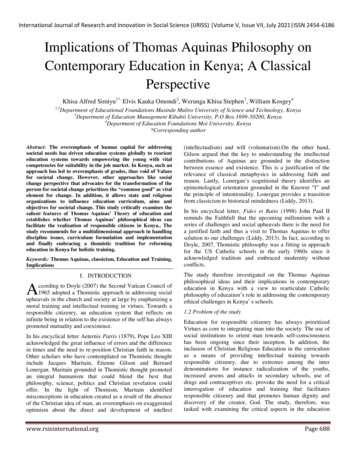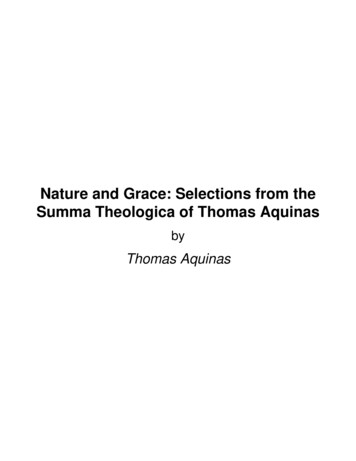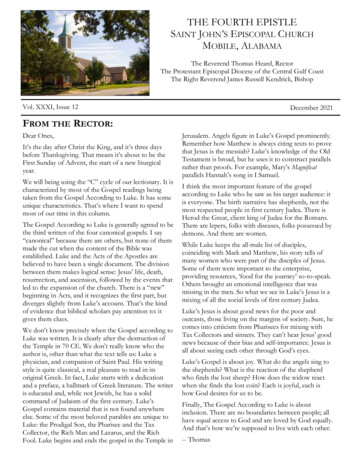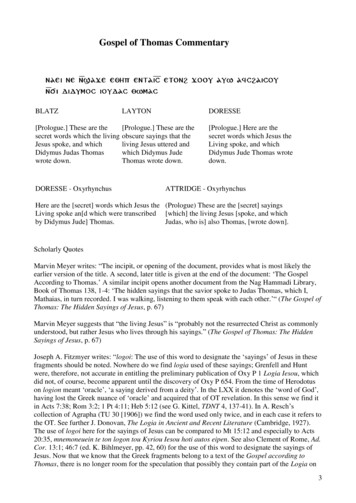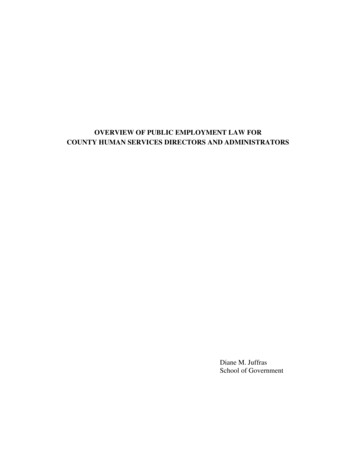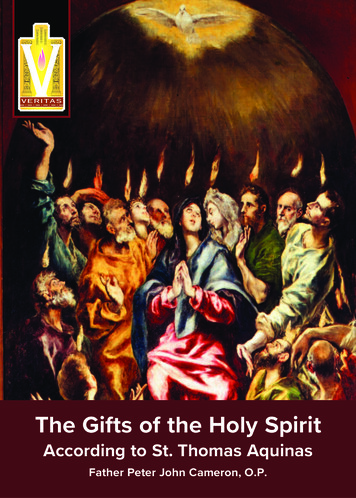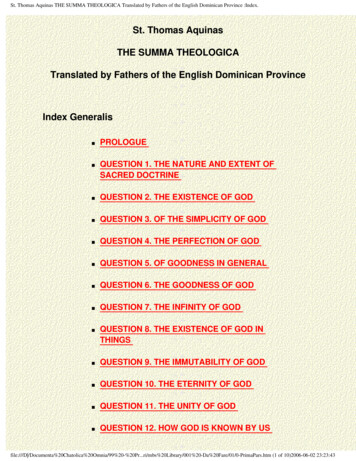
Transcription
A N E SSAY BY A NDREW T ORGESENTHOMAS AQUINAS ON REASON ANDREVELATIONJ ANUARY 20, 2019
For much of the medieval era, the theoretical sciences, as championed anciently by Aristotle, are popularly seen as being either in direct conflict with or extremely subservient tothe study of the word of God as it is revealed by canonized scripture. The theoretical sciences entail the pursuit of all truth through reason, and the prevailing Augustinian viewis that the only worthwhile use of reason falls within the domain of direct religious applicationall other intellectual pursuits are deemed superfluous and symptomatic of the lustof the eyes. This viewpoint can be characterized as faith seeking knowledge. St. ThomasAquinas, who lives at a time when the writings of Aristotle have been revealed onceagain to western civilization as they are translated into Latin, offers a substantially different view of the pursuit of knowledge. His ideas champion the notion that revelationand the use of reason for the theoretical sciences are equally necessary in Gods plan formankind. In contrast to the Augustinian model of faith seeking knowledge, Aquinas advocates for knowledge seeking faith. In spite of my finding the occasional lack of nuancein Aquinas conception of the relationship between reason and revelation, I sympathizemuch more strongly with his view than St. Augustines, for it gives equal weight to thewords and acts of God in a manner that is comprehensible, while granting fundamentalimportance to mankinds chief defining characteristic.To justify the comparable significance of both reason and revelation, Aquinas addressesthe concerns of those who extoll reason and revelation as the supreme source of truth, respectively. This is not surprising, for the believer and the philosopher tend to harbor verydifferent models of the universe. According to Aquinas, the philosopher thinks aboutcreatures according to their proper natures, whereas the believer only concerns himselfwith how those creatures are related to God. Aquinas must bridge the gap between thesetwo models. To do this, he must justify the usefulness of one model to those who espousethe other. He must also prove that the two epistemological models do not pose relativethreats to one another, as would be the case in the Augustinian conception of a zero-sumgame.Aquinas justifies the use of revelation to the philosopher in part by distinguishing between two kinds of theology derived from revelation: positive and negative. Positivetheology speaks to scriptural proclamations and demonstrations of what God has done,and these lendthemselves to the examination of reason. For example, revelation revealsthe nature of mankind, as well as what humanity must do to live in harmony with goodness. These principles can be reflected on by the philosopher, not falling outside of thedomain of reason. Moreover, the theologian may even turn to reason to find interrelationsbetween divine principles and defend those principles against the accusation of beingnonsense. One may ask, if positive theology can be traversed by the tools of reason, thenwhat is the need of approaching such points from a theological point of view? In responseto this question, Aquinas claims that diverse ways of knowing give rise to different sciences, appealing to the Aristotelian conception of coexisting domains of knowledge. If theastronomer and the philosopher can both come to the conclusion that the earth is round1
by different reasonable means, then positive theology can give rise to familiar conclusionswith a perspective that still brings much needed insight.A similar question may be posed: why should God rely on supernatural means to communicate knowledge which can be obtained by the senses? Aquinas answers this question by envisioning what the world would be like if there were no revelation. If God didnot use revelation to reveal reasonable truths about His works, then few would ever cometo possess a knowledge of God in this life. This is because most individuals do not pursueknowledge for its own sake, and many lack the resources, mental faculties, or freedomfrom mortal responsibilities necessary to dedicate time to such a monumental pursuit ofknowledge. In addition, given the nature of human reason, which is subject to all mannerof biases and false associations, it would be too easy for lies to become intermingled withtruth were there no mediating force. It would be too difficult to dispel all the interspersedlies in the minds of the many, especially in the minds of those who are not well-versed inthe process of demonstration. To counteract these unfortunate phenomena, Aquinas argues that the certitude which comes from faith is needed as a buttress to support reasonssearch for the knowledge of God. I agree with this sentiment, though for subtly differentreasons. As the rational mind attempts to comprehend and attribute meaning to naturalphenomena, it runs up against a large roadblock. The roadblock is the sheer volume ofknowledge which can be attained in this life; how is one to know which objects of knowledge are more important to pursue? This problem is exacerbated by the deep separationwhich I believe exists between what is (that is, what can be observed through the senses)and what ought to be. In other words, I do not think there is any way to justifiably imposedirection-giving meaning onto phenomena, using pure reason, without presupposing theexistence of a particular narrativethrough which to view life. Pure demonstration cannotlead one to that which is not observable, including finding a purpose and source of allthings in the universe. Thus faith, inasmuch as it conforms to a coherent narrative aboutthe purpose of creation and all things pertaining to it, acts as a guiding light in the pursuitof knowledge through reason.To further justify the value of revelation to the philosopher, Aquinas must give a convincing argument that there can exist revealed truths whose full meaning defies all comprehension. These are truths which cannot be grasped by the senses, which, accordingto Aquinas, is because the senses are lower than He who created them, and somethinglower cannot comprehend what is higher unless a bridge is created by what is higher.For justification of this notion, Aquinas offers the premise that men are ordained by Godto a purpose which extends beyond anything that can be experienced or thought of inthis life. Thus, in order for mankind to be motivated to work toward such a lofty goal,mankind must first learn of the existence of such higher forms of being and knowing.I find nothing logically inconsistent in this argument. However, it is difficult for me toconceive of any fully satisfactory logical bridge between what is actionable (what can bedone by man) and what is incomprehensible (the nature of God) that is useful for mansbetterment. For man to be truly motivated, I believe that a more understandable Godand gospel is neededno one can wholeheartedly love something of which one has no realconception. Partially addressing this line of reasoning, Aquinas offers the promise that anadmittance that there are divine truths beyond human comprehension leads to a foment2
ing of intellectual humility. Knowing that God comprehends what man cannot, Aquinasargues, will counteract the disposition of many to put their own opinions in the highestregard, thus opening the door to improvement for the soul. I mostly agree with this point,though I also recognize that, historically, forcing reason to take a backseat to revelation inthe name of pious humility has sometimes resulted in atrocities of varying degrees. I canonly assume that Aquinas presupposes that every word revealed by God, fully comprehensible or not, will only inspire mankind to do good. After all, he claims that even themost imperfect knowledge about the most noble realities brings the greatest perfection ofthe soul. I cannot personally make such a sweeping statement.There are still others who would claim that reason has no place in the face of divine revelation. Even among the strongest critics of reason, it is acknowledged that human beingsare naturally seekers of knowledgea point raised anciently by Aristotle. The Augustinianviewholds that everything which man does through the natural urges alienates him fromGod. Aquinas, in contrast, asserts that man has the ability to perform works which gradually become perfected by the grace of God, rather than destroyed. For Aquinas, mansability to reason constitutes the works to be perfected, and faith is a gift of perfectinggrace. Thus, the natural desire for knowledge is fundamentally tied to the natural desire for perfection. Perfection is defined as attaining the fullest form of what is naturallygiven. For example, humans do not naturally have wings, so flying is not included inthe perfection of humans. The differentiating characteristic of humans is rationality, however, and the mind desires to be developed as a potential for perfection. In essence, mandesires to acquire and be shaped by knowledge, just as matter desires to be shaped byform. I find this argument to be compelling, though I dont see anything barring one fromusing the same argument to justify the development of any arbitrary characteristic foundto be unique to humans, such as the ability to formulate elaborate deceptions. That is, unless one could argue that the development of knowledge simultaneously diminishes onesdesire for the development of other, less holy characteristics of the human condition.An important idea in Aquinas conception of the relationship between reason and revelation is that reason can never truly oppose what is accepted on faith. One reason is thatfaith encompasses truths which lie beyond the senses, and reason cannot reach what isbeyond the senses. I agree with this point, just as I think that what ought to be (constituting an unobservable ideal) cannot be derived directly from what is. Regarding truthsaccepted on faith which lie within the realm of the senses, Aquinas claims that the theoretical sciences cannot muster an opposing truth which is, at the same time, constrainedto be the only possible conclusion. While this may often be the case, I do not believe thatthis argument holds for cases in which reason is able to uncover a logical inconsistencyamong the revealed truths themselves. Science, due to its conjectural nature, is unable toever make definitive statements of truth. However, science can definitively reject theories which demonstrate internal inconsistencies; this is how progress is made within thesciences as bad explanations which make false predictions are soundly rejected.If one is to accept the relative importance and relevance of both reason and revelation,then Aquinas offers a compelling picture of their roles within Gods plan for mankind.For Aquinas, viewing both reason and revelation through Aristotles epistemological lens3
of demonstration, the major difference between reason-based philosophy and revelationbasedtheology is found in their principles, or starting points. The principles of philosophy are, to a certain extent, knowable through deep reflection as being self-evident. Theprinciples of theology are based in faith, and cannot be learned through experience orpure reflection. By revelation, God is believed to be the first cause, and the movement ofeverything in the universe can be traced back to His design. The bridge between philosophy and theology is created after one first seeks to learn about the world through thesenses, according to the order of knowing. Because mankind naturally desires knowledge, it will never cease searching until it has arrived at the first cause. Direction in thesearch is given by what has been given by revelation to be examined by reason. Thereinevitably comes a point when reasoning through the senses ceases to find more truthswhich can be derived from experience. That is when reason comes to rely on revelation,which knows the cause before the effect and can thus pick up the search for the first cause.It is after the limits of the senses have been exhausted that mankind comes to truly appreciate the truths revealed beyond the realm of experience. For Aquinas, the fullest form ofhappiness lies in these truths, which can never be fully comprehended in this life.In the end, Aquinas says that our appreciation of the knowledge revealed by God gives arationale for Gods creating the universe. The unchanging God, as the first cause, createsthe universe, and His creations are separated from Him through a loss of intelligence andperfection. The perfection of the universe occurs when everything in it reunites with itssource. According to Aquinas, it is mans intellect which allows this union to occur. Theintellect allows man to bear an increasing likeness to his source, and man will not stopinquiring until he arrives at the source. Therefore, mankind makes Gods creation worthwhile by its ability to recognize and move closer to God through increasing intelligence.Coming to know God through the application of reason, as guided and extended by theapplication of revelation, represents the height of human intellect, and the incrementalrealization of human perfection.I agree with Aquinas that exercising faith in the revealed word of God for the purposeof directing and extending the intellect is, overall, extremely beneficial for the humancondition. It provides a reliable sense of meaning, and motivates us to be better to eachother, most of the time. For this reason, I believe that faith must be accepted alongside theuse of reason. Also for this reason, I think that this acceptance of faith is ultimately basedin a desire to believe, and not in epistemological certainty, which I believe is impossible toacquire in this life. There will always be alternative descriptions of reality which appealto propositions beyond the reach of thesenses while in this life, and our models of realityalways hinge on the validity of the fundamental principles and axioms which we have noway of definitively proving true. Aquinas offers the comforting notion that at least livinga life directed by faith in revelation can be seen as consistent with a noble and enlargingpurpose for all of mankind.4
Thomas Aquinas, who lives at a time when the writings of Aristotle have been revealed once again to western civilization as they are translated into Latin, offers a substantially dif- . According to Aquinas, the philosopher thinks about . and gospel is neededno one c
